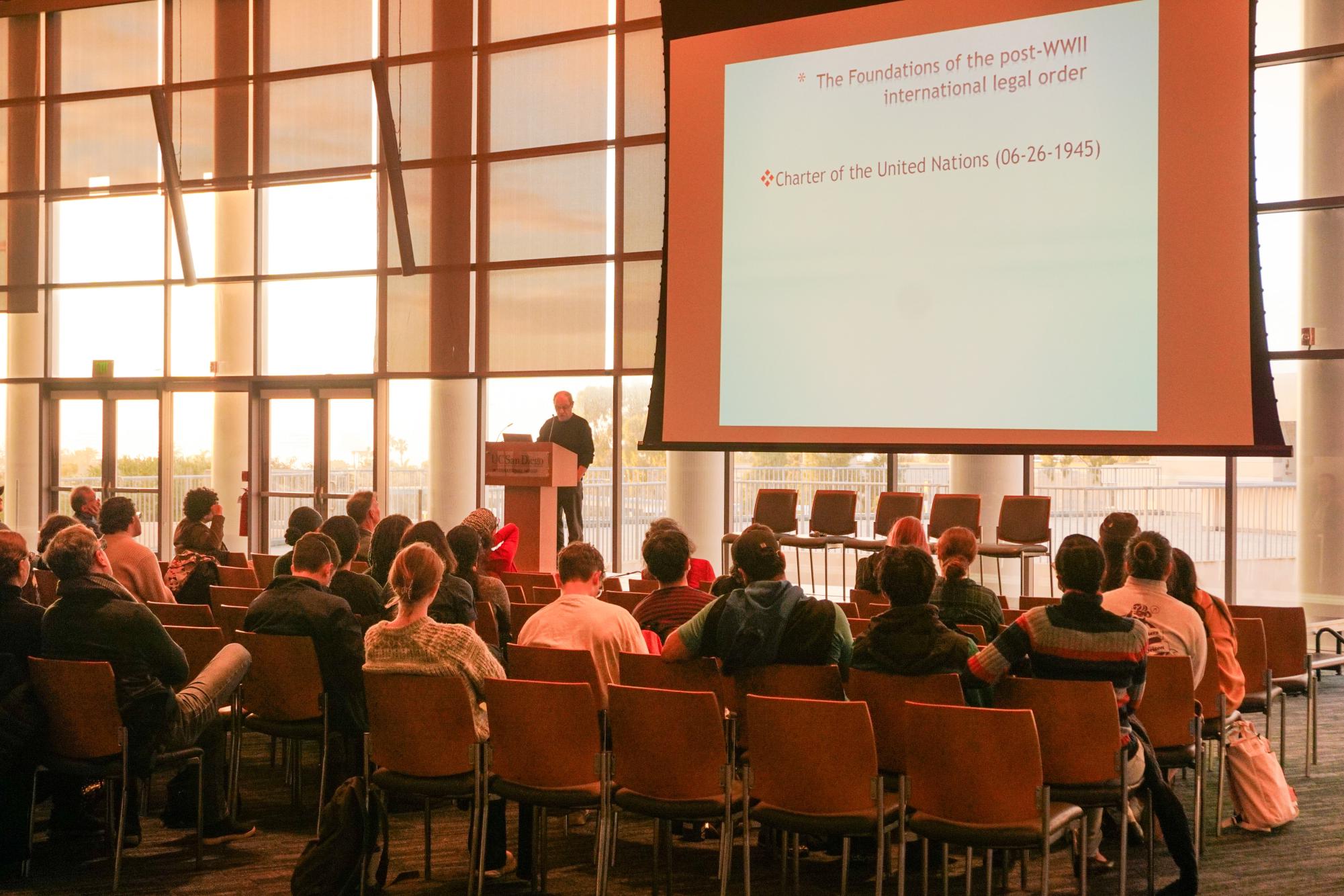Editor’s Note: This article contains possibly triggering accounts of violence in the Gaza Strip. Reader discretion is advised.
At Great Hall in Eleanor Roosevelt College on Thursday, Feb. 1, faculty from UC San Diego and San Diego State University held a teach-in headlined “Gaza: War, History, Hope.” The event featured presentations from four speakers as well as a question-and-answer session.
Professor Nir Shafir of UCSD’s department of history began the teach-in with an overview of Gaza’s history, including previous outbreaks of violence between Israel and Hamas, and the Great March of Return, a massive 2018-19 wave of non-violent Palestinian protests to which Israeli security forces responded with deadly force.
Shafir’s lecture culminated with a discussion of Hamas’s attack on Israel on Oct. 7 of last year and Israel’s retaliatory campaign against Gaza. Shafir particularly stressed the impact of Israeli military action on civilians in Gaza, noting that 1.9 million Gazans are now internally displaced and 400,000 are in a state of famine, reduced to eating grass and drinking contaminated water. Shafir finished by critiquing the perceived lack of concrete or achievable military goals for Israel’s campaign, saying, “It is difficult not to conclude that the purpose of a lot of this is the collective punishment and destruction of the Palestinians in Gaza.”
Dr. Michael Provence, a professor of history at UCSD, based his talk on his analysis of Israel as a colonial state.
“The colonial state only responds to violence and it only employs violence,” Provence said. He argued that the current conflict has definitively disproved the Netanyahu government’s claims that the status quo between Israel and Palestine could be prolonged indefinitely.
“The claims of sustainability, of permanent management of the conflict — the delusional bankruptcy of these claims has been on display to everyone,” Provence explained. “Every imperialist in history thought the empire would live forever. The long-term prospects for colonial states in the Middle East are not encouraging.”
SDSU chemistry professor Manal Swairjo, who was born in Gaza, told the story of her upbringing in a refugee family and her emigration initially to Egypt and then to the United States. Similar to Shafir, Swairjo stressed the impact that the war has had on Gazan civilians and particularly on members of her own family — Swairjo stated that 13 members of her extended family have been killed by Israeli bombing since the war began and that only four of her cousins in Gaza are still alive. Swairjo reaffirmed the value of dialogue between Jews and Arabs and called on those in the audience to join the Boycott, Divest, and Sanctions movement to end U.S. support for Israel.
The last speaker was Gershon Shafir (no relation to Nir), a professor of sociology at UCSD. Shafir’s lecture discussed the issue of international law as it relates to the Gaza conflict. He focused particularly on the case that the government of South Africa has brought before the International Court of Justice, charging Israel with the crime of genocide. The professor referenced his own background when discussing the obligation to prevent genocide in the 21st century.
“As the son of a father who cried in his sleep for the rest of his life remembering the eight-and-a-half months he spent in Auschwitz, who was named after a murdered uncle, who grew up in the smallest of families,” Gershon Shafir said, “This is a dark and shameful chapter.”
The war in Gaza has sharply divided faculty across the UC system. In December, 150 faculty members from all nine UC campuses sent an open letter to UC President Drake, condemning the Board of Regent’s plans to overhaul the Middle Eastern history curriculum and enforce an allegedly “viewpoint-neutral” outlook on the Israel-Palestine conflict.
Earlier, shortly after the Oct. 7 attacks, the UC Ethnic Studies Faculty Council generated controversy with its statement in support of the Palestinian cause. In November, members of UCSD’s literature department called on the university to take an unequivocal pro-Palestine stance and back the BDS movement; the letter did not indicate how many faculty had signed the statement. Conversely, 300 faculty members at UCLA published an open letter condemning alleged hate speech and antisemitism at pro-Palestinian demonstrations, an allegation that pro-Palestinian activists and faculty have strongly denied.
For more coverage of campus responses to the conflict in Gaza, read our previous and continuing coverage at ucsdguardian.org.










Wendy Blair • Feb 6, 2024 at 6:10 am
A teach-in that presents a singular point of view. How very Academic of you. No wonder your students are so unable to engage in civil discourse, or understand critical thinking.